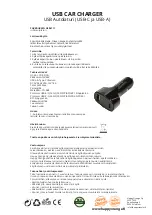
FAULT TRACING
WHEN THE ENGINE STALLS
OR WILL NOT START
The information given below is only in-
tended to serve as a guide in localizing
and temporarily correcting minor faults.
After having carried out any such meas-
ures, have them checked and adjusted by
an experienced mechanic.
The engine does not start although the
starter motor turns it over at normal speed
1. Check that there is fuel in the tank.
2. If the engine is warm, starting should be
done with the accelerator pedal slowly
depressed as far as it will go.
3. In wet weather the spark plug insula-
tors should be wiped clean and the distri-
butor cap removed and wiped dry if flash-
over is suspected.
4. Check that the fuel line connections on
the pump and carburettor are not leaking
and that fuel is supplied to the carburettors.
5. If the engine is turned over for a while
without having started, too rich a fuel mix-
ture can enter the cylinders so that the
spark
plugs
become
wet.
Blow the
cylinders clean by screwing out the spark
plug and turning over the engine with
the starter motor. Dry the spark plugs
before fitting them.
5 6
If the engine still does not start
1. Remove the ignition lead from each
plug in turn. Hold the end of the lead
about
'l4"
from the cylinder block while
turning over the engine with the ignition
switched on. If there is a strong spark,
the fault is probably in the spark plugs,
so these should be changed.
2. If only a weak spark is obtained or none
at all, check to see whether the ignition
l eads are properly inserted in the distri-
butor and ignition coil.
3. Remove the distributor cap, check and
clean all contact surfaces. Check that the
contact breakers close properly when the
engine is turned over. If the contact
breaker arm shaft binds, oil it very spar-
i ngly.
If the engine misfires, the reason can be:
1. That one of the ignition leads has
l oosened in the distributor cover or from
the sparking plug.
2. That one or more of the spark plugs
i s coated with soot or oiled up, in which
case the plug concerned should be clean-
ed or changed and the spark plug gap
adjusted.
3. That the distributor cap and rotor arm
are cracked or damaged.
4. That one of the ignition leads is in a
poor condition.
5. That the contact breaker gap in the
distributor is insufficient or non-existent.
6. That the contact breakers are badly
burnt.
How to start your car downhill
Switch on the ignition, pull out the choke if
required, engage 3rd gear or even 4th and
l et the car roll downwards with the clutch
pedal depressed. When the speed is up to
15-20 km.p.h. (9-12 m.p.h.), and not be-
fore, release the clutch pedal slowly.
Being towed: Secure the towline to the
towing loop. The car is towed at an even
speed in 2nd gear. Try starting as sug-
gested in the previous paragraph.
Summary of Contents for 164 1971
Page 1: ......
Page 2: ...Operating Instructions Description Servicing Reprinting permitted if source quoted...
Page 4: ...CONTENTS...
Page 7: ...OPERATING INSTRUCTIONS...
Page 25: ...TECHNICAL DESCRIPTION Engine compartment...
Page 32: ...31...
Page 58: ...SPECIFICATIONS 57...
Page 59: ...SPECIFICATIONS or corresponding 58...
Page 60: ...SPECIFICATIONS 59...
Page 61: ...LUBRICATING CHART...
Page 63: ......
Page 65: ......









































